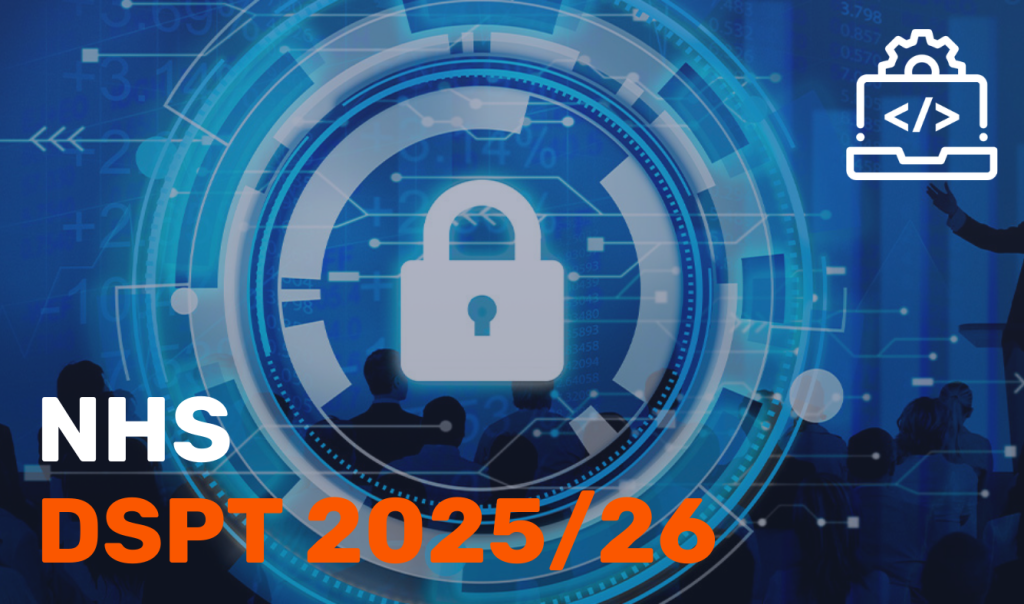The NHS Supply Chain has strengthened its cyber security expectations for suppliers. The aim is simple: protect patient services from growing cyber threats and make sure every supplier plays their part. If you currently supply to the NHS—or hope to in the future—this guide explains what’s changing, who’s affected, and how to get compliant without the jargon.

Why Cyber Security Matters for NHS Suppliers
The NHS depends on thousands of partners—from IT and software providers to equipment manufacturers and service companies. If even one supplier is compromised, it can disrupt hospitals, delay care, and put sensitive data at risk. Meeting the NHS Supply Chain’s cyber security requirements protects your organisation and helps safeguard patient services.
What’s Changing
NHS Supply Chain is tightening supplier assurance. In practice, you can expect:
- Clearer baseline security controls (such as multi-factor authentication, timely patching, and secure configuration).
- Stronger evidence requirements (with Cyber Essentials Plus a preferred route).
- Better contract hygiene (right-to-audit clauses, incident reporting timelines, and vulnerability management expectations).
- Closer alignment with NHS and government guidance across data protection and resilience.
Who Is “In Scope”?
You are likely “in scope” if any of the following apply:
- You handle NHS Supply Chain personal data (for staff, customers, or suppliers).
- You supply IT or digital products or services as part of your contract.
In these cases, expect to be asked for evidence of baseline controls—most commonly Cyber Essentials Plus (CE+).
Cyber Essentials Plus (CE+): The Baseline
Cyber Essentials Plus is a government-backed, independently audited certification that focuses on five core areas:
- Secure configuration
- Firewalls and internet gateways
- Access control and user management
- Malware protection
- Patch management and timely updates
CE+ is renewed annually and proves your defences work in practice, not just on paper. If you don’t hold CE+ yet, you may be asked to complete an interim information security questionnaire—however, working toward CE+ is strongly recommended and increasingly expected.
DSP Toolkit (DSPT): If You Access NHS Patient Data
If your organisation accesses or processes NHS patient data or connects to NHS systems, you must complete the Data Security and Protection Toolkit (DSPT) each year. The DSPT uses an outcomes-based approach and increasingly aligns with recognised assessment models, which means you’ll need clear, current evidence of how you protect data, train staff, manage incidents, and monitor risk.
NHS Cyber Security Charter: Eight Practical Actions
NHS England’s Cyber Security Charter for suppliers sets practical “table-stakes” controls.
Expect to evidence:
- Multi-factor authentication across critical systems.
- Up-to-date, supported software and prompt patching.
- 24/7 monitoring and centralised logging for key system.
- Immutable, regularly tested backups and clear recovery plans.
- Least-privilege access and strong identity management.
- Clear incident response processes and reporting timelines.
- Supply-chain oversight for your own third parties.
- Board-level accountability and regular exercises
DTAC: For Digital Health Products
If you supply a digital health product (for example, an app, patient portal, device companion app, or platform used in care), buyers will assess it against DTAC (Digital Technology Assessment Criteria). Be prepared with evidence for:
- Technical security and data protection
- Clinical safety
- Interoperability
- Accessibility and usability
What If You’re Not Certified Yet?
Don’t panic—many suppliers are still on the journey.
- New suppliers will encounter cyber questions during onboarding.
- Existing suppliers may be asked to complete an interim questionnaire if certificates are not yet in place.
- The direction is clear: move toward CE+ (and DSPT where relevant) so you are contract-ready and renewal-ready.
What Buyers Will Look For
- A valid Cyber Essentials Plus certificate (or accepted interim evidence while you progress).
- DSPT status if you access NHS data or systems, with up-to-date evidence.
- DTAC packs for digital health technologies.
- Contract-grade controls: MFA, monitoring, tested backups, patching cadence, incident reporting SLAs, right-to-audit, and clear vulnerability management.
Practical Steps to Get Compliant (and Stay There)
- Run a gap analysis against CE+ controls. Prioritise MFA, patching, secure configuration, and malware protection.
- Start your CE+ journey early. Evidence collection and audit booking take time.
- Register and complete DSPT if you access patient data. Keep evidence current and aligned to outcomes.
- Harden day-to-day operations: implement 24/7 monitoring, centralised logging, immutable backups, and tested recovery.
- Update contract annexes: include right-to-audit, incident reporting timelines, vulnerability disclosure, and patch SLAs.
- Train your people: run phishing awareness, data handling, and incident drills—human error remains the top risk.
- Repeat and improve: renew CE+ every year, refresh DSPT annually, and keep DTAC artefacts up to date for product tenders.
Quick FAQs
Is ISO 27001 enough instead of CE+?
No. ISO 27001 is valuable, but it is not a like-for-like substitute for Cyber Essentials Plus, which is specifically referenced as a baseline.
Do overseas suppliers need CE+?
Yes. The same baseline expectations apply if you supply into NHS Supply Chain.
What happens if we can’t evidence compliance?
Buyers can make risk-based decisions, including pausing or not awarding contracts, if suppliers cannot demonstrate appropriate controls.
Is basic Cyber Essentials acceptable?
Possibly as a temporary step with evidence, but CE+ is increasingly the expected standard for in-scope suppliers.
Bottom Line
Meeting NHS Supply Chain’s cyber security expectations is now part of doing business with the NHS. Get your Cyber Essentials Plus in place, complete DSPT if you access patient data, prepare DTAC evidence for digital products, and embed the Charter’s practical controls across your operation. You’ll protect your organisation—while helping protect the NHS and its patients.
Contact Creative Networks Today
Creative Networks supports suppliers at every step, with a focus on the certifications NHS buyers expect most:
- Cyber Essentials (CE) readiness: gap analysis against the five controls, remediation plan, self-assessment preparation, evidence pack.
- Cyber Essentials Plus (CE+) audit support: pre-audit checks, technical hardening, remediation guidance, liaison with the certification body, audit-day readiness.
- ISO 27001 (ISMS) implementation & certification support: scope and SoA definition, risk assessment and treatment, policies and procedures, internal audit, management review, Stage 1/Stage 2 audit preparation.
- Control mapping: align CE/CE+ controls with ISO 27001 to reduce duplication and ongoing effort.
Contact Creative Networks today to book a readiness assessment and accelerate your path to Cyber Essentials, Cyber Essentials Plus, and ISO 27001 certification.




